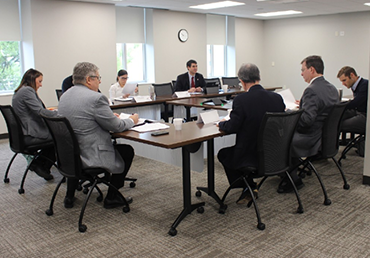
What is an Advisory Committee? Most career and technical education (CTE) programs and all ASE Accredited training programs have an industry Advisory Committee. The members are local business and industry owners, managers, and technicians, along with educators and administrators from the school. Parents and local elected officials may also be part of the committee.
Members who become familiar with the program and are potential employers of graduates have a unique perspective of a training program. They can provide an informed viewpoint that is invaluable to the educational process. Local committees create partnerships between the education program and the industries and communities they serve.
Why is it important? These programs are training your future employees. The best way to ensure that the students are getting the needed instruction is for industry to tell the school what is most important. This seems obvious, but without active input from local business, it does not always happen. That is a loss for you, the school, the community, and most importantly, the student.
Besides getting to know the administrators and instructors, you can also meet the students and get to know them before they graduate. This is key when considering future hires.
How does it work? The committees are designed to assist the school administration and the program with guidance and recommendations from an industry or employer perspective, on ideas such as equipment purchases, skills needed by local industry, and certifications that students can earn while in school that provide value to employers. Committee members also ensure the programs have the needed quantities and quality of tools for students, that the facility is adequate for training and provide opportunities for interviewing and work-based learning (aka part-time jobs while still in school).
What is the time commitment? Advisory Committees typically meet for 1 -2 hours twice a year. Once involved, you will likely find additional opportunities to work with the instructors and students, through career days, mock interviews, job shadowing, internships, and other activities. Meetings are held at the school or virtually during COVID. You can also offer to host an advisory meeting at your company. This provides an opportunity to showcase your company and facilities to other committee members and school administrators.
What are the benefits? There are many benefits, both personally and professionally, from being involved with your local programs. You and others in your company who are involved will have a sense of pride from the help you are providing students just getting started in their careers. Other benefits include:
Opportunity to build a relationship with instructors and students (who often attend these meetings)
Ability to understand the skills students are learning and help match it to what you need in entry-level employees
Opportunity to review the resources and investments the program has and identify current and future needs in curriculum, tools, and equipment
Time to engage with students, administrators, instructors, and parents, building brand awareness for your company
Awareness of other programs the school offers that can fill employment needs in other areas of your company
Who should attend? It is important that decision makers from your organization attend to better understand what is being taught, what the program has to offer, where students have been placed in the past, and how being involved can benefit your organization. Multiple people from an organization can and should be involved either collectively or from time-to-time. The following individuals can provide value to committee and create a pipeline of future employees.
Dealer Principal, Business Owner, or General Manager – High level individuals from your company can have great influence on programs and especially administration. These individuals do not have to attend all meetings and can delegate responsibilities to others in the company.
Manager or Shop Foreman – The person who directs the service operations your company can identify and communicate the skills that are needed to secure entry-level employment and career pathways in your organization.
Technicians – These are the people working in the shop every day and understand the technology and skills of the occupation. Many techs came from an education program and can provide information on the transition from education to industry.
Former Students – These are the individuals who walk the halls and sat in the same seat as current students. They are a product of that program and can provide great insight to the needs of the program. They can be a great ambassador for the company. Administrators truly respect the recommendations of these individuals.
Human Resources Directors – HR personnel can provide guidance and recommendations on barriers to employment and especially navigating on-line applications that can cause havoc for students and schools. Their involvement could open the doors for potential new employees that in the past may not have applied.
What’s the bottom line? Volunteering to serve on the Advisory Committee is the easiest way to start your partnership with a school and get a clear overview of the opportunities that exist to benefit both parties.
Step 4 of 8